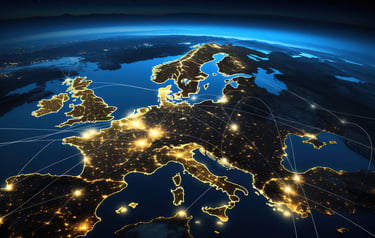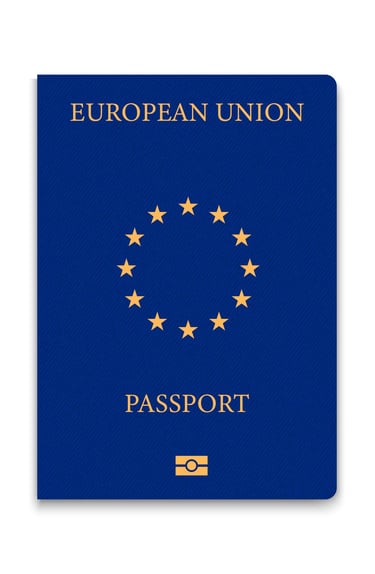EUROPE


Europe is a continent rich in history, culture, and diversity. It is home to many countries, each with its own identity and characteristics. The European Union, created in 1957, is a political and economic organization that comprises 27 member countries. It aims to promote peace, stability, and prosperity across the continent.
Whether you are a traveler seeking adventure, an art and history enthusiast, or a businessperson looking for new opportunities, Europe has much to offer.
EUROPE
EUROPE
YOUR EUROPE
The symbols of the European Union
The European anthem
Beethoven's "Ode to Joy" without lyrics became the official anthem of the EU in 1985. Listen to the anthem and learn more.
The motto of the European Union
The motto "United in diversity" became that of the EU in 2000.
Europe Day
Europe Day is celebrated every year on May 9th. It commemorates the historic declaration made by Robert Schuman on that day, and celebrates peace and unity in Europe.
The European flag
The European flag is the symbol of the European Union and, more broadly, of the identity and unity of Europe.
The member countries of the EU
The member countries of the Eurozone
1. Germany
2. Austria
3. Belgium
4. Bulgaria
5. Cyprus
6. Croatia
7. Danmark
8. Spain
9. Estonia
10. Finland
11. France
12. Greece
13. Hungary
14. Irland
15. Italiy
16. Latvia
17. Lithuania
18. Luxembourg
19. Malta
20. Netherlands
21. Poland
22. Portugal
23. Czech Republic
24. Romania
25. Slovakia
26. Slovenia
27. Sweden
The member countries of the European Union are as follows:
These countries form the European Union and cooperate in many areas, such as trade, environment, security, and foreign policy, in order to strengthen European integration and promote the common interests of its members.
The member countries of the Eurozone, which use the euro as their common currency, are as follows:
1. Germany
2. Austria
3. Belgium
4. Cyprus
5. Spain
6. Estonia
7. Finland
8. France
9. Greece
10. Irland
These countries have adopted the euro as their official currency and are part of the Eurozone, also known as the Economic and Monetary Union (EMU). They benefit from a common monetary policy managed by the European Central Bank (ECB) and are subject to common economic rules and criteria.
Specialized websites on European current affairs
Euractiv internet portal dedicated to European issues
Euronews international news channel
Europarl the European Parliament's news website
Sauvons l’Europe association mobilizing civil society for a democratic and solidarity-based Europe
Le Taurillon eurocitizen magazine, published by Young Europeans
11. Italy
12. Latvia
13. Lithuania
14. Luxembourg
15. Malta
16. Netherlands
17. Portugal
18. Slovakia
19. Slovenia
Passport to Europe
Living in Europe offers cultural diversity, excellent quality of life, professional opportunities, ease of travel, security, and access to a rich cultural and leisure offering.
Thanks to the removal of border controls and the rights of European citizens, it has become much easier to live and work in another EU country.
However, it is important to note that each EU country may have its own rules and procedures regarding residence and work. Therefore, it is recommended to inquire about the specific country where you intend to live to understand its particularities and specific advantages.
Europe Direct is an information service of the European Union that provides answers to your questions about the EU and helps you find the information you need. You can contact them for general questions about the EU, including on the free movement of people and the rights of European citizens.
Call us | European Union


Practical Guide for EU Citizens
Living in Europe
If you wish to work, move, or travel within the European Union, it is recommended to follow the advice and information provided by Europe Direct. They can assist you in answering your questions and finding the information you need.
In case of any issues or need for assistance, you can contact Europe Direct at 00 800 67 89 10 11. They are available to help you and provide useful advice.
Coming to the European Union
If you are from a non-EU country and wish to immigrate to an EU member state, you can find useful information in this link.
If you are a citizen of an EU country, you can also find information there about the rights of European citizens and their non-European family members. If you have any other questions regarding the EU, you can contact Europe Direct.
Staying in Europe
Do you want information about the formalities of staying in Europe and the administrative procedures? Feel free to contact us at 0189480494 or visit Europe Direct. You can also call 00 800 67 89 10 11 for assistance.
Work & Retirement in Europe
Besoin de conseils pour travailler ou prendre votre retraite en Europe ? N'hésitez pas à nous contacter ou à vous adresser à Europe Direct. Nous sommes là pour répondre à toutes vos questions et vous fournir des conseils précieux en cas de difficulté.
Education in Europe
Do you have questions about European initiatives in the Youth and/or Education sectors? We're here to help!
If you encounter any difficulty, feel free to contact us at 0189480494 or reach out to Europe Direct by calling 00 800 67 89 10 11. We are available to answer all your questions and provide advice."
Healthcare in Europe
When living or traveling in Europe, it's important to understand the steps to take regarding healthcare. It's essential to inquire about different health insurance options, know the local emergency numbers, and take preventive measures against diseases. Don't forget to apply for your European Health Insurance Card and to take out private health insurance if necessary.
Traveling in Europe
Planning a trip to Europe? We're here to help! If you need advice, information about destinations, transportation, accommodations, or any other aspect of your trip, feel free to contact us at 0189480494 or reach out to Europe Direct. We are available to answer all your questions and provide valuable advice. Have a great trip in Europe !
Address
22, rue Louise Chenu, 94470, Boissy-Saint-Léger
Contacts
+33(1) 84 23 53 47
info@europe94.eu
